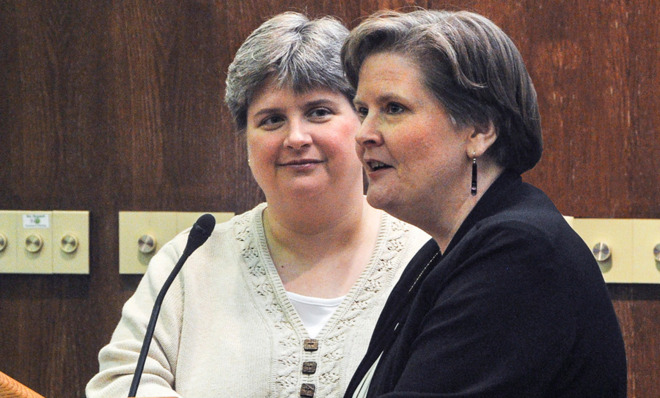After DOMA, Oklahoma drags its feet on gay marriage
It's been a watershed year for gay rights. But in the Sooner State...

A free daily email with the biggest news stories of the day – and the best features from TheWeek.com
You are now subscribed
Your newsletter sign-up was successful
Since the Supreme Court overturned part of the Defense of Marriage Act this summer, there's been a domino effect at the state level, with five state legislatures and the New Jersey courts legalizing same-sex marriages.
But in Oklahoma, it's another story.
As the Associated Press reports, two couples suing the state over its ban on same-sex marriages have been waiting for nine years — the "longest-running active lawsuit against the Defense of Marriage Act," as the AP puts it — just to get their case heard.
The Week
Escape your echo chamber. Get the facts behind the news, plus analysis from multiple perspectives.

Sign up for The Week's Free Newsletters
From our morning news briefing to a weekly Good News Newsletter, get the best of The Week delivered directly to your inbox.
From our morning news briefing to a weekly Good News Newsletter, get the best of The Week delivered directly to your inbox.
Oklahoma is one of 29 states to have a constitutional ban on same-sex marriages. It was approved by voters in November 2004, and almost immediately followed by a lawsuit. The suit was filed by two lesbian couples — Mary Bishop and Sharon Baldwin and Gay Phillips and Susan Barton — and challenges the constitutionality of the ban as well as certain parts of DOMA.
The case was first stalled in 2009, when the Tenth Circuit Court of Appeals ruled that the couples lacked standing to sue the governor and the attorney general, since neither issues marriage licenses. The suit was amended to name the Tulsa County court clerk, who does.
But the couples are still waiting for District Court Judge Terence Kern to set new a hearing for the amended case. An initial date had been scheduled for May 2012, but Kern, like other lower court judges throughout the country, postponed it until after the Supreme Court could hear one of the DOMA cases that were winding through the federal courts. That happened in June.
In United States v. Windsor, the court held that Section 3 of DOMA, which defined marriage as between a man and a woman, at least when it comes to receiving federal benefits, is unconstitutional under the equal protection component of the Fifth Amendment.
A free daily email with the biggest news stories of the day – and the best features from TheWeek.com
As a direct result of the decision, a New Jersey court ruled that the state's civil unions law was unconstitutional. New Jersey was a unique case because it already had a civil unions law on the books, plus a 2006 state Supreme Court decision had specifically afforded all of the same rights of marriage to same-sex couples, even though the unions would not be called "marriages."
After the DOMA decision, it became more difficult to argue that this law did not violate the constitutional principle of equal protection, as now legally married same-sex couples in other states would be able to receive federal benefits, while couples in civil unions would not. As a result, Judge Mary C. Jacobson of the New Jersey Superior Court ruled that "[t]he ineligibility of same-sex couples for federal benefits is currently harming same-sex couples in New Jersey in a wide range of contexts. Same-sex couples must be allowed to marry in order to obtain equal protection of the law under the New Jersey Constitution."
In Oklahoma and elsewhere, it's proven more difficult for same-sex couples to gain traction. This is because, for one thing, the Supreme Court only addressed the constitutionality of Section 3 of DOMA, and did not rule on whether same-sex marriage is a fundamental right. This means that states can still decide for themselves whether or not to legalize same-sex marriages, and the DOMA decision is limited to those states that do.
Furthermore, under Section 2 of DOMA, which still stands, states are not required to recognize same-sex marriages that have taken place in other states. The lawsuit in Oklahoma challenges this part of DOMA as well.
"The court's decisions confirmed that it is up to the states to decide how to define marriage, not the federal government," Oklahoma Attorney General Scott Pruitt told The Oklahoman just after the Supreme Court handed down its decision. "As a result, Oklahoma's constitutional provision that defines marriage in Oklahoma as between a man and a woman remains valid."
In a brief filed with the District Court after the DOMA ruling, Baldwin and Bishop argued that despite this, their continued inability to get legally married is "inconsistent with Windsor's overall rationale, one which repeatedly underscored the egregious unfairness suffered by same-sex couples…..Only a constitutional removal of Oklahoma's marriage ban as violative of Plaintiff's equal protection and due process rights will provide same-sex couples in Oklahoma all the federal benefits and responsibilities that are available now in 13 states and the District of Columbia."
But so far there's been little movement on the case: "We've had absolutely no guidance from the judge in terms of what he's thinking, what his idea of is how this is going to proceed," Baldwin told the AP.
"While some people are getting their day in court and finding justice, we are sitting here, for nine years, with our hands tied," said Bishop.
-
 The year’s ‘it’ vegetable is a versatile, economical wonder
The year’s ‘it’ vegetable is a versatile, economical wonderthe week recommends How to think about thinking about cabbage
-
 Moltbook: The AI-only social network
Moltbook: The AI-only social networkFeature Bots interact on Moltbook like humans use Reddit
-
 Judge orders Washington slavery exhibit restored
Judge orders Washington slavery exhibit restoredSpeed Read The Trump administration took down displays about slavery at the President’s House Site in Philadelphia